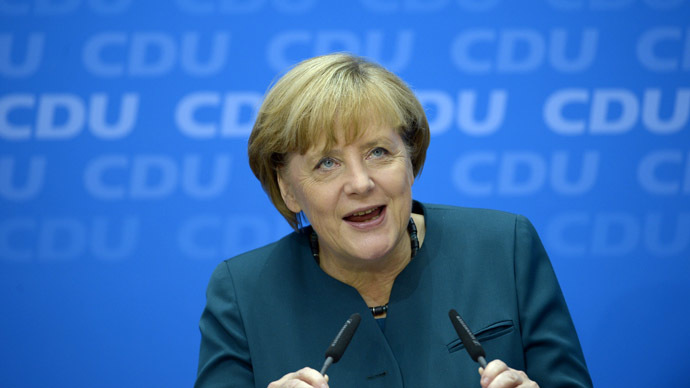Merkel has no ‘mandate from Germans’ to continue her policy, unlikely to finish term

The Alternative for Germany party poses a big threat to the future of Germany's political establishment, as traditional parties fail to address the issues which are worrying the public, Dr. Markus Kerber, founder of the Europolis think-tank, told RT.
He argues that the main reason behind the new party’s gaining
popularity is the ability to act on the discontent of Germans
over the issues surrounding the eurozone crisis, which have been
“camouflaged” during the election. Unless the crisis is
tackled, Chancellor Angela Merkel is unlikely to serve her full
third term, Kerber said.
RT:Why has Angela Merkel failed to gain the absolute
majority?
Markus Kerber: There has been a great migration of voters
from liberals to several parties. The disappointment of many
liberal voters with the liberal party has led to the uprising of
a new party which is mainly focusing on Eurosceptic ideas.
Secondly, the German voters, for a lot time, have not given the
absolute majority to Frau Merkel.
There is one positive thing about that election – one can no
longer doubt the authority of Frau Merkel, although there is some
sweet poison in that victory. The victory is so tremendous that
Frau Merkel cannot govern without the support of other parties.
We are now being tired from the problems that will come out
sooner or later.
During the election campaign there has been a camouflage of most
of the problems of the eurozone. These kinds of problems will now
come up again and Merkel would need to face up to these problems,
and she would have to be supported by some of the parties in the
German parliament. That would be very difficult. She can no
longer muddle through.

RT:Is it likely she'll choose the Social Democrats as her coalition partner?
MK: There is no guesswork to do about who is going to be the coalition partner. She does not have a choice of many parties there. There are the communists, the Greens, and the Social Democrats. It is most likely that she will choose after some decency of a period - let’s say a month - with the Social Democrat party, because she has a lot of practice with Social Democrats. But apart from that, the situation is so delicate and so dangerous to handle in the middle run.
My prognosis is that I do not think she will finish her four year term and there will be a facing up of the real problems of the eurozone within a very short notice. She has no majority, no mandate from the German people to continue her policy.
RT:That is quite a prediction because many say third terms are problematic, that they do come with challenges. So this third term could be a poisoned chalice for Angela Merkel, mainly because of the problems in Europe?
MK: I still remember the great victory of Willie Brandt, the architect of the East Policy in 1972. This was the beginning of the end of the Brandt chancellorship because he was not able to maintain its power. The great victory always poisons those who claim it and now the Christian Democratic Party is in the party mood. That party mood will be over tomorrow when the real practical problems come up.
RT:What about the Alternative for Germany - they've only been around for seven months and came in just short of the necessary 5 percent. What does it say about the Euroscepticism within Germany? Is it a warning sign for Merkel?
MK: It is a big warning sign because the big parties have not addressed the issues which are worrying the Germans. There has never before been a party, which is really not a party – a protest movement - from almost nothing, from scratch, which comes in at almost five percent. The weak point of that party is that they don’t even have a program. They don’t even have a program for the resolution of the eurozone crisis. So far, they have only been gathering protestors, gathering discontented people from the left and the right. And they don’t have a charismatic leader.
If they get a program and a charismatic leader, that would be a
real menace for Merkel. But for the time being, that is not the
case.
The statements, views and opinions expressed in this column are solely those of the author and do not necessarily represent those of RT.












